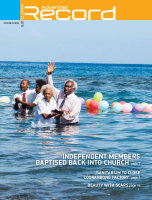Same-sex marriage became legal in all American states in a landmark decision by the US Supreme Court on June 26. The Court declared by a margin of 5 to 4, “that states must licence same-sex marriages and recognise similar unions from other states”.1 The Wall Street Journal called it “among the most dramatic cultural shifts in US history”.2
Andrews University Professor of Church History, Nicholas Miller, similarly calls it a “seismic shift”, saying: “The twentieth-century West is unique in recorded history in experiencing a cultural shift claiming that sexual mores are only private and subjective . . . it is impossible for the Christian church not to be affected.”3
This “seismic shift” is part of a much wider context. 1960 was a watershed year when things happened that changed Western society forever. For example, the neo-Charismatic movement, called the "Third force in Christendom", began when Pentecostalism, with its highly emotional tongue-speaking, spread to established churches.4
Another development was the rise of "humanistic psychology" founded by Abraham Maslow, with its "encounter psychology" and "human potential movement".5 Maslow said thinkers were reacting to “the total collapse of all sources of values outside the individual” that left “no place to turn but inward to the self, as the locus of values”.6
Perhaps the most obvious development was the counter-culture hippie movement. It was an "anything goes" and "do your own thing" culture, with a new religion of drugs and Eastern mysticism, sexual liberation and rock music.7 Coinciding with the sexual revolution was the release of the contraceptive pill in 1960.8 George Barna says the baby boom generation, born 1946-1964, “has redefined America’s ways of life”.9
Bob Dylan, perceptively in tune with the times, sang in 1964: “Don't criticise what you can't understand. Your sons and your daughters are beyond your command. Your old road is rapidly agein'. Please get out of the new one if you can't lend your hand, For the times they are a-changin'.”
Western society had been built on a biblical basis from the Reformation. Now the "old road" of biblical objective moral values was becoming obsolete and the "new one" of subjectivism was taking its place.
As the youth began to live by these concepts the media (TV and rock music) communicated them to the masses. By 1960 television was in 87 per cent of US homes.10 TV provided an atmosphere for the new environment that led to a new society.11
We now live in a postmodern world, where the 1960s “anything goes, do your own thing” counter-culture has become the culture of today. In the past 50 years cohabiting before marriage has increased by almost 900 per cent.12 Marijuana, the hippie drug of the 1960s, is progressively being legalised. Belief in God has been discarded as a superstitious relic of the past. People are regarded as dinosaurs and intolerant bigots if they appeal to biblical values in morals.
How did it get this way?
Modern science grew out of a Christian world view of a rational God who created an orderly universe, and rational humans who could appreciate it13 (this is why it developed in the West, not the East), yet as science became more successful its Christian base began to be forgotten. God was occasionally brought in to explain otherwise inexplicable phenomena—as God of the gaps. As scientific knowledge increased, the gaps got smaller and God became unnecessary.14
The main creed of the 19th century was the belief that progress was “automatic and inevitable”,15 as an outgrowth of the Enlightenment and the Industrial Revolution. But for the natural scientists there was still an important gap—explaining where life and human beings came from.
This gap was filled in 1859 by Darwin's The Origin of Species. Colin Brown, Professor of Systematic Theology at Fuller Theological Seminary, states: “This book has done more to undermine popular belief in God, and thus the meaning of life, than any other book.”17
Scientific rationalism put humans at the apex of the evolutionary pyramid, thinking they could arrive at ultimate truth about life without outside help. The only reality was empirical reality—what they could observe with their senses. But it shut human beings in a rationalistic box, without any supernatural God. Instead of exalting human beings, it reduced them to the level of biochemical machines.
It has only really been in the 20th century that we’ve seen the full explosive results of rationalism placing human beings in a closed system—without God. The 19th century was full of optimism. Before theTitanic sailed a crew member said, “God Himself couldn’t sink this ship!”18 That optimism was shattered by two world wars, the Great Depression and the atomic bomb.
Early 20th century existentialist philosophers, while still accepting the evolutionary presuppositions of chance and meaninglessness, said: “You’re not a machine, you’re human.” (Christians know this because we’re made in the image of God) “Assert your humanity!” they said. How? By jumping out of the box! But this had to be irrational because the box stood for rational reality.19
The hallmark of our age is a deep dichotomy between reason and meaning, between the "rationalistic box" and optimism.20 All attempts to find meaning today, outside of biblical Christianity, are in the area of non-reason.21 Think, for example, of the popularity of Eastern meditation (called yoga in India), where the mind is an illusion and the way to ultimate reality is by emptying the mind.
We now live in an age of meaninglessness and despair because many have given up the hope of finding a unified answer to life. It’s a postmodern society (another name for existentialism), characterised as follows:
- Life is meaningless. If life happened by chance then it has no purpose.
- There are no moral absolutes or objective truths. There’s no right or wrong in an evolutionary world view where it’s survival of the fittest.
- Individuals become their own subjective authority. What is "right" becomes what "feels good" or "what works". What is wrong becomes what "feels bad" or "what doesn’t work".
- People live comfortably with contradictions. Profession and practice don’t have to match. In the area of non-reason you can have all sorts of contradictions.
This philosophy has affected all of us via the media. While the sex and violence will harm us, far worse is the absence of God where anything goes. Without a moral framework people are vulnerable to manipulation. Revelation 13 pictures the great majority being squeezed into one mould of behaviour.
As the counter-culture of the 1960s has become the culture of today, so Christianity should now be the counter-culture. True Christianity is not conservative—it’s revolutionary! The greatest need today is for a radical Christianity to stand against the culture and not be swept along by it. Living consistent lives in sharing the good news about Jesus says more about Christianity than all the preaching by the greatest evangelists. We can only do this when we realise that our assurance depends on the finished work of Jesus and not on us. It’s a paradox of Christianity that only those who have a centre outside themselves, in Christ, will have the inner fortitude to stand against the deceptions of the devil in the last days.
- Ryan Teague Beckwith. Supreme Court Orders States to Recognise Same-Sex Marriage. Time, June 26, 2015. http://time.com/3937244/supreme-court-gay-marriage-decision/
- http://www.wsj.com/articles/a-more-perfect-union-1435357205
- R.E. Gane, et. al., (Eds.). Homosexuality, Marriage and the Church: Biblical, Counselling, and Religious Liberty Issues. (Berrien Springs, MI: Andrews University Press 2012), viii, ix.
- Anthony A. Hoekema, What About Tongue Speaking? (Exter: The Paternoster Press, 1966), 30.
- J.B.P. Schaffer, Humanistic Psychology. (New Jersey: Prentice-Hall, 1978), pp. 3-4.
- Toward a Psychology of Being. (2nd ed.), (New York: Van Nostrand Reinhold, 1966), 10.
- H.R. Rookmaaker, Modern Art and the Death of a Culture. (London: Inter-Varsity, 1970), 162, 184.
- Nancy Gibbs. The Pill at 50: Sex, Freedom and Paradox. Time, Apr. 22, 2010.
- State of the church series, 2011. Part 2. Generational change. July 27, 2011.
- http://www.tvhistory.tv/facts-stats.htm
- John W. Whitehead, The Second American Revolution. (Elgin, Illinois: David C. Cook, 1982), 136.
- Arielle Kuperberg. March 10, 2014, http://contemporaryfamilies.org
- Legality of cannabis by US jurisdiction, Wikipedia.
- Robert E.D. Clark, Science and Christianity—A Partnership. (Mountain View, California: Pacific Press, 1972), 11.
- Denis Alexander, Beyond Science. (Berkhamsted, Herts: Lion Publishing, 1972), 103.
- P. Roubiczek, Existentialism: for and against. (Cambridge: University Press, 1966), 18.
- Philosophy and the Christian Faith. (London: Tyndale, 1969. revised ed. 1971), 147.
- Reader's Digest, July 1986, 204.
- Rookmaaker, 48.
- Francis F. Schaeffer. How Should We Then Live? (Old Tappan, New Jersey: Fleming H. Revell, 1976), 174.
- Rookmaaker, 48.
Errol Webster writes from Bathurst, New South Wales.





